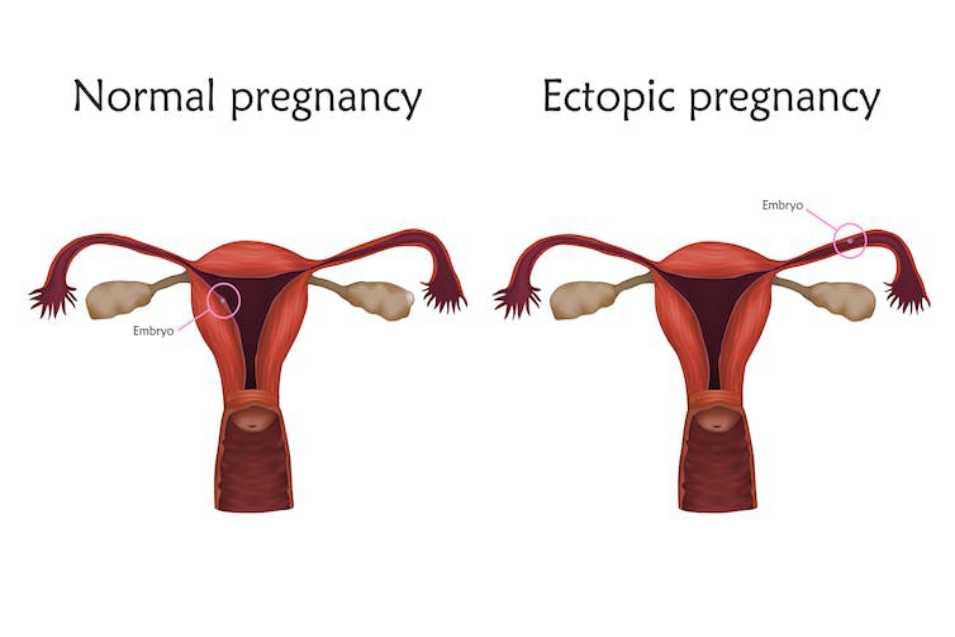An ectopic pregnancy develops when a fertilized egg implants somewhere other than the uterus, most frequently in one of the fallopian tubes. In extreme cases, it can be fatal.
Early diagnosis is critical for treatment success and for reducing maternal mortality. Sensitive pregnancy tests and advanced pelvic ultrasound are important tools for detecting ectopic pregnancies early.
Ectopic Pregnancy Symptoms
An ectopic pregnancy is the development of a fetus outside of the uterus, typically in a fallopian tube that has been abnormally developed or is scarred. Ectopic pregnancy is rare and only happens in about 1 in 100 pregnancies.
Vaginal bleeding is a common symptom of an ectopic pregnancy. It can be watery and dark brown, like a regular period.
Abdominal pain, usually low on one side of your abdomen, is another symptom. This pain may be persistent or come and go.
Your doctor, nurse or midwife will take a medical and sexual health history to determine if you have an ectopic pregnancy. If they think you do, they’ll do a pelvic exam and an ultrasound to examine the baby and test your blood for the hormone hCG.
If you have an ectopic pregnancy, treatment will help to prevent it from growing and causing complications. If it does grow, you’ll need surgery to remove it.

How is an ectopic pregnancy diagnosed?
In an ectopic pregnancy, a fertilized egg implants in a place other than the uterus (the part of your body that is meant to carry a baby). The most common location for it is in one of your fallopian tubes. Other sites include the ovary, the cervix or the abdomen.
A doctor will look for signs of an ectopic pregnancies if you are concerned that you may be experiencing one.These symptoms often begin between weeks 4 and 12 of pregnancy or two to 10 weeks after fertilization.
Human chorionic gonadotropin (hCG) is a hormone generated by the placenta, and your doctor may do a pelvic exam or prescribe urine and blood tests to evaluate your hCG and other hormone levels. They can also look for signs of bleeding that suggest an ectopic pregnancy.
Related Article: Effleurage Massage Pregnancy
Ectopic Pregnancies Treatment
Fortunately, it is now often treated with medication or surgery. The treatment of choice depends on the stage and location of your ectopic pregnancy.
Early ectopic pregnancies without unstable bleeding are most often treated with methotrexate, which dissolves the pregnancy tissue. This medication is given by injection and has to be followed carefully.
Having an IUD during conception, being older, or having had tubal ligation increases the risk of ectopic pregnancy (tying your fallopian tubes).
If you have an ectopic pregnancy, contact your doctor immediately and tell them about any additional medical conditions. They will help you get the best treatment for you and your health.
Ectopic Pregnancies Healing Process
The complications from an ectopic pregnancies are extremely dangerous. It happens when the fertilised egg implants outside the uterus, normally in the fallopian tube or ovary, and cannot develop normally.
Your doctor will probably treat your ectopic pregnancy with medicine or surgery. Your recovery will take time.
You may feel tired and have abdominal pain or discomfort for a while. It takes a while for the hCG levels in your body to drop back to normal.
Surgical treatment (key-hole surgery) can remove the fertilized egg and fallopian tube. It is usually done under general anesthesia.
You will need to attend follow-up appointments to monitor hCG levels and ensure the it is completely removed. Your healthcare team will also send any tissue to a laboratory for testing.
Related Article: Prenatal Massage
